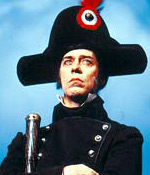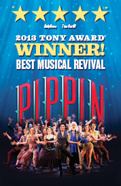Pippin’s Terrence Mann on Les Miserables, Cats & More Roles of a Lifetime
Two-time Tony nominee Terrence Mann created leading roles in three of Broadway’s longest running musicals: Cats, Les Miserables and Beauty and the Beast. His intensity onstage and rich, deep voice have kept him in demand for more than three decades, and he’s currently having a wonderful time playing Charlemagne, the title character’s war-loving father, in the Broadway revival of Pippin. “Doing this show, at this time, with my wife [co-star Charlotte d’Amboise] and director Diane Paulus, is just a gift from the gods,” he says. For his Role Call, Mann chose to spotlight his three iconic musicals, plus three other shows that could not be more different.
 Role That Was the Most Profound
Role That Was the Most Profound
“Les Miserables [1987, as Javert; Best Actor Tony nomination] was the most profound experience I’ve had as a performer. I treated it like Shakespeare, because it had big emotions, big words and big outcomes. Javert was a man who believed in the fear and discipline and order of God—Old Testament stuff, as opposed to New Testament. He felt driven by divine right to capture Valjean, and that resonated with me, having grown up in the South going to church. As wrongheaded and without love as Javert was, the role felt purposeful. I had heard the music, but I had no idea how unique the storytelling would be. The song ‘Stars’ didn’t really have an ending on the London cast album; we worked on ways to make more of a statement with it. The way the show was laid out lyrically, you just walked into it, and a wave would carry you along every night.”
 Role That Was My Big Break
Role That Was My Big Break
“Everyone knew that Cats [1982, as Rum Tum Tugger] was going to be a big show, with [composer] Andrew Lloyd Webber and [director] Trevor Nunn and [choreographer] Gillian Lynne. With such a huge advance sale, you knew you would be working for at least a couple of years, so being cast in it was an enormous break. Cats was almost a glorified children’s tale, but it also turned a corner on what musical theater could be. Andrew wanted an Elvis vibe from my character, and I remember saying, ‘I’m not an Elvis kind of guy. I’m more of a Mick Jagger kind of guy.’ And he said [imitating Lloyd Webber’s clipped British accent], ‘Oh, all right. Fine. Go ahead, go ahead.’ With that costume, thank god I was thin!”
 Role That Was the Most Difficult
Role That Was the Most Difficult
“The first time I put on the prosthetics in Beauty and the Beast [1994; Best Actor Tony nomination], it took eight hours, though we eventually got it down to 40 minutes, with two makeup artists. The final run-through before the Houston [pre-Broadway] run was magical. Nobody wore costumes; we just sang the songs and read the play. The love story came across with so much heart in Linda Woolverton’s book. When we put the prosthetics on, suddenly you couldn’t see the humanity of the characters. After the dress rehearsal, I remember [Disney executives] Michael Eisner and Jeff Katzenberg saying, ‘We can’t do this!’ They gathered makeup artists from all over Houston and had them tear away prosthetic pieces so you could see our faces and our bodies. It was so insightful on their part to realize that things had gone too far. I liken that show to wearing five of your heaviest winter coats, gluing three angora cats to your head then running around the block in the summertime for two hours.”
 Role That Was the Most Fun
Role That Was the Most Fun
“The Rocky Horror Show [2001, as Frank ‘N’ Furter] was the most fun I have ever had, legally or illegally. It was a balls-to-the-wall, crazy experience, brilliantly directed and so much fun to do every night. We had bodyguards and bouncers at the midnight shows because people would try to climb up on the stage; you never knew what to expect from the audience, which kept everyone on their toes. All kinds of people played the Narrator—Dick Cavett, Penn and Teller—and Sebastian Bach came in as Riff Raff at one point; it was awesome to meet people from different areas of entertainment. Rocky Horror was a show I always wanted to do, so it was really special time.”
 Role That Taught Me the Most
Role That Taught Me the Most
“The most eye-opening experience I’ve had in a musical was Assassins [1990, as Leon Czolgosz]. Just to be in the room with Stephen Sondheim and [director] Jerry Zaks and people like Victor Garber and Jonathan Hadary and Deb Monk was a huge turning point for me as an actor. I played Leon Czolgosz, the worker who killed President McKinley. He was a zealot who got caught up in the politics of the time; he was spurred on by others to do it. [Hearing about the show], you go, ‘Wow, Assassins?’ But it’s Stephen Sondheim and [book writer] John Weidman, so you just jump on board, because you know it’s going to have gravitas and unique storytelling.”
 Role That Was the Most Surprising
Role That Was the Most Surprising
“The show that rejuvenated my passion for musicals was My Fair Lady [2011, as Henry Higgins], which I did at Connecticut Repertory Theatre. When you start working on one of those old book musicals, you realize why they are still around: the words, the words, the words. It comes down to great storytelling, where characters are introduced with humor and sincerity and audiences starts to care about them. In this case, you really care about [Higgins and Eliza]; you want them to get together. To be on stage saying those words and singing those songs—I was reinvigorated by the whole notion of being in a musical.”

